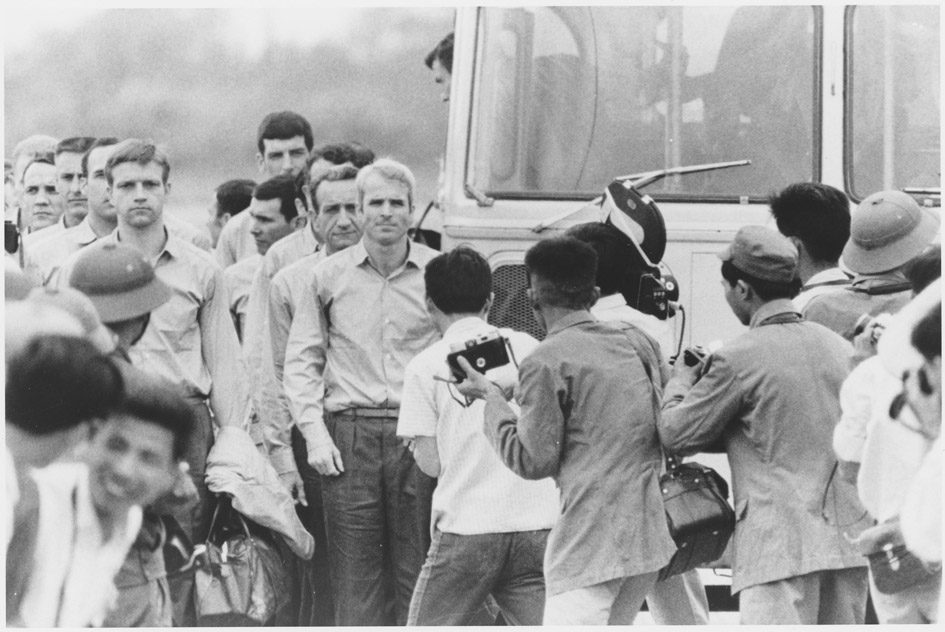

John McCain passed away August 25, 2018 at the age of 81. By all accounts, he was a very admired, respected, and when called for, controversial man.
John McCain’s life is proof that some truths are timeless. Character. Courage. Integrity. Honor. A life lived embodying those truths casts a long, long shadow. John McCain will cast a long shadow. His impact on America hasn’t ended. Not even close. It will go on for many years to come. – Joe Biden
Some lives are so vivid, it is difficult to imagine them ended. Some voices are so vibrant, it is hard to think of them stilled. John McCain was a man of deep conviction and a patriot of the highest order. He was a public servant in the finest traditions of our country. And to me, he was a friend whom I’ll deeply miss. – George W. Bush
Character. Courage. Integrity. Honor. These are words that came up repeatedly in the many news articles and social media posts from politicians, celebrities, veterans and people from around the country and around the world.
McCain survived over 5 years of unspeakable torture and deprivation as a prisoner of war in Vietnam. McCain survived through his deep faith, in God, his fellow inmates and in his country. He came home from the war, not bitter, as many would have been, but humbly grateful.
Dr. Harry K. Beecher of Harvard Medical School made an interesting observation concerning 215 wounded men from the Anzio beachhead in World War II:
Only one in four soldiers with serious injuries (fractures, amputations, penetrated chests or cerebrums) asked for morphine, though it was freely available. They simply did not need help with the pain, and indeed many of them denied feeling pain at all. Beecher, an anesthesiologist, contrasted the soldiers’ reactions to what he had seen in private practice where 80 percent of patients recovering from surgical wounds begged for morphine or other narcotics.
Here you have two groups of people suffering from the same exact injuries. Unlike the civilians, the soldiers’ responses to pain were impacted by the fact that their injuries carried with them a sense of meaning – a result of being involved in a significant mission for their country. They also had a deep feeling of gratitude that they had survived.
Perhaps it was this sense of gratitude that fueled years of public service. Beginning in 1982, after winning a seat in the U.S. House of Representatives, then serving as a longtime Senator for the state of Arizona, and eventually running for the presidency, twice. In his recent farewell address to Congress, McCain humbly said:
Ten years ago, I had the privilege to concede defeat in the election for president. I want to end my farewell to you with the heartfelt faith in Americans that I felt so powerfully that evening.
McCain had the “privilege” to concede defeat. There are not many who would consider the loss of a presidential election a “privilege.” But he was grateful he had been given the opportunity to run for the highest office of the country he loved.
I am reminded of a wonderful essay by C.S. Lewis entitled, “The Necessity of Chivalry.” He points out how in medieval times, the ideal hero was both humble and kind, yet bold and strong. Lewis saw that the medieval ideal required this “double demand” from a knight. In the essay he says:
The knight is a man of blood and iron, a man familiar with the sight of smashed faces and the ragged stumps of lopped-off limbs; he is also a demure, almost a maiden-like, guest in hall, a gentle, modest, unobtrusive man.
Lewis says the chivalrous knight has a duality of character in that he is fierce to the nth degree but is meek and humble as well. He believed that the medieval ideal brought these two qualities together even though they “have no natural tendency to gravitate towards one another.”
Today’s heroes are strong, dynamic people who also have this paradoxical blend of being humble and kind, yet brave and fearless.
I have often observed that I am the luckiest person on earth. I feel that way even now as I prepare for the end of my life. I have loved my life, all of it. I have had experiences, adventures and friendships enough for ten satisfying lives, and I am so thankful. Like most people, I have regrets. But I would not trade a day of my life, in good or bad times, for the best day of anyone else’s. – John McCain
Richard E Simmons III is the founder and Executive Director of The Center for Executive Leadership and a best-selling author. Portions of today’s blog came from Richard’s book The Power of a Humble Life.
Add grace and understanding to your day with words from Richard E. Simmons III in your inbox. Sign-up for weekly email with the latest blog post, podcast, and quote.

Bulk discounts for 25 or more books! Call 205-789-3471 for prices.
For local orders in the Birmingham, AL area, enter Promo Code LOCAL at checkout to save shipping. We will email you when your order is ready for pickup.